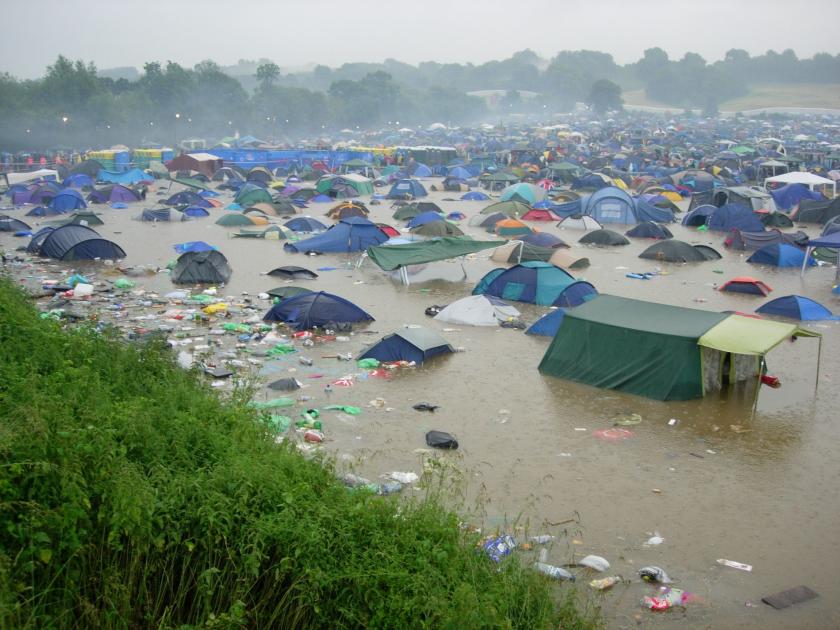You could tell Glastonbury at 40 was in trouble as early as the opening three minutes, when it cut from a well-heeled, ageing hippie survivor mumbling about “earth magic” to footage of Robbie Williams in 1998 bashing his way through the entirety of "Angels". The programme stumbled into the vast gulf between those two concepts as uncertainly as a reveller stumbles into the wrong tent at four in the morning, and never once looked like finding its way back home.
Despite the fact that for nearly two decades the BBC has been sending its staff to Pilton in battalions stretching well into the hundreds, Glastonbury at 40 could barely muster the wit or energy to reach beyond the same handful of clichés you’d expect to hear from the mythical man on the street. Every lazy signifier was ticked off: mud, Arthur Brown, Somme-like toilets, dancing hippies, naked hippies, stoned hippies, each squeezed between 20 clips of notable past performances.
Narrated with his usual blokey good humour by Mark Radcliffe, there was a smattering of diverting historical stuff about the origins of Worthy Farm and the festival's early days (I was happy to learn that members of Quintessence had had to help erect the scaffolding back in 1970), but mostly the programme was content to crunch through the gears of its creaky A-Z format (itself always a tell-tale sign of a lack of any kind of sure direction), without musically or editorially putting even one speculative toe outside the tent of convention.
The musical clips focused almost exclusively on those tedious, over-hyped Glastonbury "moments" which miraculously only arrived following extensive TV coverage kicking in: Pulp in 1995, Radiohead in 1997, Bowie in 2000, McCartney in 2005, Elbow in 2008. The oldest performance aired was Oasis sledge-hammering through "Roll With It" in 1995, while more than half dated from the last five years. The message was clear: if it wasn’t on film, it didn’t happen. Or at least didn't matter.
In effect, this was a history of the Beeb’s coverage of Glastonbury, a two-hour television programme about a TV version of a festival, which rather worked against the broad sweep promised by the title. Even then, it needn’t have been quite so stodgy, but when someone's idea of "edgy" constituted film of Queens of the Stone Age featuring Dave Grohl with his shirt off, there was little hope of anything even vaguely innovative leaking on to the screen. There was brief mention of the John Peel Stage, but nothing that had ever happened on it was deemed worthy of inclusion. Instead we got Shirley Bassey hitching up her dress.
The only mitigating factor is that perhaps the real Glastonbury remains essentially unfilmable. Julien Temple had a decent stab at capturing some of the essence of the festival with his recent documentary, but for most of us who have sampled it in the flesh Glastonbury remains an oddly personal, almost private affair. I first attended in 1989 as a wide-eyed 15-year-old, a lost weekend with the wayward drummer from my first band which began with a £5 bus ride from Bristol on which we were befriended by a distracted lady (who happily revealed she had a lump of hash hidden in her knickers) and her beau, who we later realised was actually her pimp. We leapt over the fence on a perfect Saturday afternoon to the sound of Van Morrison surging through "Summertime in England", and later sat around the campfire listening to Elvis Costello singing "Radio Sweetheart" into the dusk. Most vividly of all, I remember at three in the morning watching a silent film about bears in the Rockies.
I’m sure each year since thousands of others have had similarly pivotal experiences that still (or will) linger. It’s not the case – as many battle-scarred naysayers would have it – that the festival is a shadow of its former self, overrun with middle-class worthies, yacking media muppets and bands for whom Glastonbury is just another whistle stop on the over-extended festival gravy train. There was plenty evidence of all those things 20 years ago, and nostalgia is by nature hopelessly rose-tinted: the more proprietorial travellers and hard-nosed London drug dealers I encountered in 1990 certainly added little to the experience. No, Glastonbury remains unique, a strange, futuristic version of some vast medieval trade fair, which is whipped up quickly and then proceeds to destroy itself over a few days. It has adapted and evolved with the times while holding on to something precious and elemental.
The trouble with Glastonbury at 40 was that almost none of that spirit - communal or musical - was in evidence. And because it didn’t really know what it was supposed to be, it settled meekly in the end for being TOTP 2 with flags.















Add comment